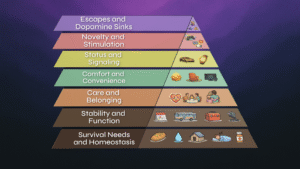Description
In this Frankly, Nate expands on our conventional definition of “taxes” to highlight nine other categories that will ‘tax’ our modern lifestyles. Traditionally, when we think of net and gross income, we only think of direct government taxes that subtract from what we take home. What are other taxes – resulting from our system’s ecology – which will factor into the way society can pay for the goods and services we’ve become used to? As converging global crises intensify and each add their own ‘tax’, can we learn to manage with a smaller “net “ resource balance sheet – and maintain our time, sanity, and humanity through the coming decades?
In French, we have a motto that says that a simple drawing is often better than a long explanation. Jean-Marc Jancovici Carbone 4 President
That’s very understandable because with left atmosphere thinking, one of the problems is that you see everything as a series of problems that must have solutions. Iain McGilchrist Neuroscientist and Philosopher
We can’t have hundreds and hundreds of real relationships that are healthy because that requires time and effort and full attention and awareness of being in real relationship and conversation with the other human. Nate Hagens Director of ISEOF
This is the crux of the whole problem. Individual parts of nature are more valuable than the biocomplexity of nature. Thomas Crowther Founder Restor
Show Notes & Links to Learn More
00:07 – Frankly on Franklys
02:17 – US adds 1 trillion in debt over the last 3 months and adding 1.5 trillion more
03:09 – US interest rates have been declining for decades
04:03 – Interest rate on new/used car is 10/14 percent
06:43 – Relocalization
06:55 – Comparative advantage
10:23 – Russell Stock Index
10:51 – AI wealth concentrating effect
11:31 – Global Heating increasing extreme weather events
12:31 – The U.S. has 50% of the world’s prescriptions, but 4% of the population
12:46 – U.S. life expectancy is declining
12:59 – 20% of GDP is healthcare







